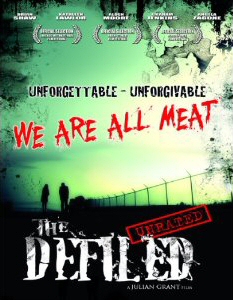
The Defiled is certainly an unusual take on the standard low-budget zombie flick: it's black and white, for starters, it's slow-moving, and - as it follows the fortunes of one of the 'infected' themselves - it is also dialogue-free. The virus-carriers themselves look like they're wearing the heavy, stylised make-up of early silent film: in fact, if you go by the blurb on the DVD cover, you'll even see that the filmmakers compare The Defiled to 'the work of Lynch, Maddin and Tarkovsky' so, if you've ever wondered about the possibility of arthouse zombies, then wonder no more.
As you might expect from the luminaries mentioned above, plot and pace aren't treated with much importance here. So much as you can describe a plot at all, The Defiled places us in a genre-film familiar post-apocalyptic world where many people have been 'infected' with a disease which makes them crave human flesh. We are introduced to an infected man and woman: apart from the pesky cannibal thing and lack of speech, the virus doesn't seem to have affected them all that much, as it seems that the woman is about to give birth. When Mrs Zombie sadly passes away, we have what may be our first example of an undead single father: dad takes the baby and sets off to find safety, rescuing an uninfected woman along the way, and trying hard to control his cannibal urges for everyone's sakes.
That's really it: from here, the film carries on as a lengthy visual exercise. At one hour and forty minutes in length, the initial novelty of the film's appearance is severely tested: it's a cardinal sin where indie films are concerned that filmmakers can't bring themselves to do more editing. The Defiled is unusual, but I felt that I wanted a little more than stylistics. Also, the sheer proliferation of low-budget films which opt to go for zombies as a theme fills me with suspicion: it often feels a bit obvious, a little unimaginative, even though in this case the writer and director did find an interesting way to approach the overflowing genre, even if it overstays its welcome.
As for comparisons with established arthouse directors, well, The Defiled certainly has more in common with them than with Romero, for instance (jokes about re-titling this one Dawn of the Dad aside) but I didn't see a great deal of Lynch in there, apart from the endless wailing of the baby à la Eraserhead. As an aside, the filmmakers seem to share an audio library with the band Tool, as the looped baby's cries are also featured in their song 'Cesaro Summability'.
The Defiled is an experiment, using a staple of low-budget horror in an obtuse way. It is unusual, but that may alienate two potential audiences: the horror buffs on one hand, who may feel out-of-step with the style of the thing, and the cineastes on the other, who may be discouraged by the theme. In addition to the feature presentation, the DVD release features something called 'Home Movies' - two short clips of what looks like two people labouring under the infection which causes all the grief in the main film - a commentary, the film's trailer, and a slide show. The sound, of which there isn't a great deal, is clear and the grainy, stark appearance of the black and white format looks interesting. If you can sacrifice your other expectations to take a look at the film's aesthetics, then this may be worth your while.
Review by Keri O'Shea
| Released by Chemical Burn Entertainment |
| Region 1 - NTSC |
| Not Rated |
| Extras : |
| see main review |